- Home
- Mario Puzo
Last Don Page 4
Last Don Read online
Page 4
Not for the first time Claudia wondered why she was so fond of Vail. Not many people were. But she had loved Vail’s novels, still did. “You’re full of shit,” she said.
Vail said, “I meant big women are sweeter. They bring you breakfast in bed, they do little things for you. Feminine things.”
Claudia shrugged.
Vail said, “Big women are good-hearted. One brought me home from a party one night and really didn’t know what to do with me. She looked around the bedroom exactly like my mother used to look around her kitchen when there was nothing in the house to eat and she was figuring out how to throw a meal together. She was wondering, how the hell we were going to have a good time with the materials at hand.”
They sipped their drinks. As always, Claudia warmed to him when he was so disarming. “You know how Molly and I became friends?” Claudia said. “She was defending some guy who had murdered his girlfriend and she needed some good dialogue for him to use in the courtroom. I wrote the scene just as if it were a movie, and her client got manslaughter. I think I wrote the dialogue and the plotline for three other cases before we stopped.”
“I hate Hollywood,” Vail said.
“You just hate Hollywood because LoddStone Studios screwed you on your book,” Claudia said.
“Not just that,” Vail said. “I’m like one of those old civilizations like the Aztecs, the Chinese empires, the Native American Indians, who were destroyed by a people with more sophisticated technology. I’m a real writer, I write novels to appeal to the mind. That kind of writing is a very backward technology. It can’t stand up against movies. Movies have cameras, they have sets, they have music and they have these great faces. How can a writer conjure that up with just words? And movies have narrowed the field of battle. They don’t have to conquer the brain, only the heart.”
“Fuck you, I’m not a writer,” Claudia said. “A screenwriter is not a writer? You just say that because you’re not good at it.”
Vail patted her on the shoulder. “I’m not putting you down,” he said. “I’m not even putting down film as an art. I’m just defining.”
“It’s a lucky thing I love your books,” Claudia said. “It’s no wonder nobody out here likes you.”
Vail smiled amiably. “No, no,” he said. “They don’t dislike me. They just have contempt for me. But when my estate gets the rights to my characters back on my death, they’ll have respect.”
“You’re not serious,” Claudia said.
“I think I am,” Vail said. “It’s a very tempting prospect. Suicide. Is it politically incorrect these days?”
“Oh shit,” Claudia said. She wrapped her arm around Vail’s neck. “The fight is just beginning,” she said. “I’m sure they’ll listen when I ask for your points. Okay?”
Vail smiled at her. “No hurry,” he said. “It will take me at least six months just to figure out how to do myself in. I hate violence.”
Claudia realized suddenly that Vail was serious. She was surprised at the panic she felt at the thought of his death. It was not that she loved him, though they had been lovers briefly. It was not even that she was fond of him. It was the thought that the beautiful books he had written were to him less powerful than money. That his art could be defeated by such a contemptible foe as money. Out of that panic she said, “If worse comes to worst, we’ll go to Vegas and see my brother, Cross. He likes you. He’ll do something.”
Vail laughed. “He doesn’t like me that much.”
Claudia said, “He has a good heart. I know my brother.”
“No, you don’t,” Vail said.
Athena had come home from the Dorothy Chandler Pavilion the night of the Academy Awards without celebrating and had gone right to bed. She tossed and turned for hours, but she couldn’t sleep. Every muscle in her body felt taut. I won’t let him do this again, she thought. Not again. I won’t live in terror again.
She made herself a cup of tea and tried to drink it, but when she saw the small tremor in her hand, she became impatient, walked outside, and stood on the balcony looking into the dark night sky. She stood for hours, but her heart still raced in terror.
She dressed. In white shorts and tennis shoes. And as the red sun began to show itself over the horizon, she ran. She ran faster and faster along the beach, trying to stay on the hard wet sand, trying to follow the coastline as the cold water washed over her feet. She had to clear her head. She couldn’t let Boz beat her. She had worked too hard and too long. And he would kill her, she never doubted that. But first he would play with her, torment her, finally he would disfigure her, he would make her ugly, thinking it would make her his again. She felt her own fury beating in her throat, and then the cool wind spraying ocean water in her face. No, no!
She thought about the Studio, they’d be frantic, they’d threaten her. But it was money, not her, they were concerned about. She thought about her friend Claudia, how this could have been her big break, and she felt sad. She thought about all the others, but she knew she couldn’t afford the luxury of compassion. Boz was crazy, and people who weren’t crazy would try to reason with him. He was smart enough to make them think they could win, but she knew better. She couldn’t take the chance. She couldn’t allow herself to take that chance. . . .
By the time she reached the large black boulders that meant the north beach ended, she was completely out of breath. She sat, trying to slow her heart down. She looked up when she heard the caw of seagulls as they swept down and seemed to glide along the water. Her eyes filled, but she pulled herself back with determination. She swallowed past the lump in her throat. And for the first time in a long time she wished her parents weren’t so far away. Some part of her felt like a small child and wished desperately to run home to safety, to someone who could put their arms around her and just make everything better. She smiled at herself then, a crooked, wry smile, remembering when she really believed that was possible. Now, she was so loved by everyone, so admired, so adored . . . and so what? She felt more empty than she thought any human was capable of feeling, more lonely. Sometimes when she found herself passing an ordinary woman with her husband and children, a woman living an ordinary life, she felt such longing. Stop! she told herself. Think. It’s up to you. Come up with a plan and carry it through. It’s not only your life that depends on you. . . .
It was midmorning before she walked back home. And she walked with her head held high and her eyes staring straight ahead: She knew what she had to do.
Boz Skannet was kept in custody overnight. His lawyer organized a press conference when he was released. Skannet told reporters that he was married to Athena Aquitane, though he had not seen her for ten years, and that what he had done was just a practical joke. The liquid was only water. He predicted that Athena would not press charges, intimating he possessed a terrible secret about her. In this he proved correct. No charges were filed.
That day Athena Aquitane informed LoddStone Studios, the studio making one of the most costly pictures in movie history, that she would not return to work on that film. Because of the attack made on her, she feared for her life.
Without her, the film, a historical epic called Messalina, could not be completed. The fifty million dollars invested would be a total loss. It also meant that because of this no major studio would ever dare cast Athena Aquitane in a movie again.
LoddStone Studios released a statement that their star had suffered extreme exhaustion but that in a month she would be recovered enough to resume shooting.
CHAPTER 2
LODDSTONE STUDIOS WAS the most powerful movie-making entity in Hollywood, but Athena Aquitane’s refusal to go back to work was a costly treachery. It was rare that mere “Talent” could deal such a damaging blow, but Messalina was the Studio “Locomotive” for the Christmas season, the big picture that would power all the Studio’s releases through the long, hard winter.
It happened that the next Sunday was the date of the annual Festival of Brotherhood charity party, held at th
e Beverly Hills estate of Eli Marrion, major shareholder and chairman of LoddStone Studios.
Far back in the canyons above Beverly Hills, Eli Marrion’s huge mansion was a showplace of twenty rooms, but the oddity of it was that it had only one bedchamber. Eli Marrion never liked anyone sleeping in his house. There were guest bungalows, of course, along with two tennis courts and a large swimming pool. Six of the rooms were devoted to his large collection of paintings.
Five hundred of the most eminent people in Hollywood were invited to this charity festival with an admission fee of one thousand dollars per person. There were bars and buffet tents and dancing tents spread over the grounds, and there was a band. But the house itself was off-limits. Toilet facilities were provided by portable units in gaily decorated, wittily designed tents.
The mansion, the guest bungalows, the tennis courts, and the swimming pool were roped off and barred by security men. None of the guests were offended by this, Eli Marrion was too lofty a personage for offense to be taken.
But as guests frolicked on the lawns, gossiping and dancing for an obligatory three hours, Marrion was in the huge conference room of the mansion with a group of people most concerned with the completion of the film Messalina.
Eli Marrion dominated this gathering. His body was eighty years old but so cleverly disguised you took it for no more than sixty. His gray hair was perfectly cut and tinted to silver, his dark suit broadened his shoulders, added flesh to his bones, insulated his pipe-thin shanks. Mahogany shoes anchored him to earth. A white shirt was vertically cut with a rose-colored tie that pinked his grayish pallor. But his rule over LoddStone Studios was absolute only when he wanted it to be. There were times when it was more prudent to let mere mortals exercise their free will.
Athena Aquitane’s refusal to complete a film in progress was a problem serious enough to command even Marrion’s attention. Messalina, a hundred-million-dollar production, the studio Locomotive, with video, TV, cable and foreign rights presold to cover the cost, was a golden treasure that was about to sink like an old Spanish galleon, never to be retrieved.
And there was Athena herself. At the age of thirty, a great star, already signed to do another blockbuster for LoddStone. A true Talent, of which there was nothing more valuable. Marrion adored Talent.
But Talent was like dynamite, it could be dangerous and you had to control it. You did that with love, with cajolery in its most abject form, you showered it with worldly goods. You became a father, a mother, a brother, a sister, even a lover. No sacrifice was too great. But there came a time when you could not be weak, when indeed you must be merciless.
So now in this room with Marrion were the people to enforce his will. Bobby Bantz, Skippy Deere, Melo Stuart, and Dita Tommey.
Eli Marrion, facing them in this familiar conference room, twenty million dollars worth of paintings, tables, chairs, and rugs, the crystal goblets and jugs totaling at least a half million more, could feel his bones crumbling within. Each day he was astonished how difficult it was to present himself to the world as the all-powerful figure he was presumed to be.
Mornings were no longer refreshing, it was fatiguing to shave, to knot his tie, to button the buttons on his shirt. More dangerous was the mental weakness. This took the form of pity for people less powerful than himself. Now he was using Bobby Bantz more, giving him more power. After all, the man was thirty years younger and was his closest friend, loyal to him for so long.
Bantz was president and chief executive officer of the Studio. For over thirty years, Bantz had been Marrion’s hatchet man, and through the years they had become very close, like father and son, as it is said. They suited each other. After the age of seventy, Marrion had become too tenderhearted to do the things that absolutely had to be done.
It was Bantz who took over from movie directors after their artistic cut and made their films acceptable to audiences. It was Bantz who disputed percentages of directors, stars, and writers and made them either go to court to collect or settle for somewhat less. It was Bantz who negotiated very tough contracts with Talent. Especially writers.
Bantz refused to give even the standard lip service to writers. It was true you needed a script to start, but Bantz believed that you lived and died by casting. Star power. Directors were important because they could steal you blind. Producers, no slouches when it came to thievery, were necessary for the manic energy that started a movie.
But writers? All they had to do was make that initial tracing on blank white paper. You hired another dozen to work it over. Then the producer shaped the plot. The director invented Business (sometimes a whole new picture), and then the stars came up with inspired bits of dialogue. Then there was the Creative Staff of the Studio who, in long, carefully thought out memos, gave writers insights, plot ideas, and wish lists. Bantz had seen many a million-dollar script from a big-shot screenwriter paid a million dollars, only to find when the picture was finished it contained not a single plot incident or word of dialogue of the writer’s. Sure, Eli had a soft spot for writers, but that was because they were so easy to screw on their contracts.
Marrion and Bantz had traveled the world together selling movies to film festivals and market centers, to London and Paris and Cannes, to Tokyo and Singapore. They had decided the fate of young artists. They had ruled an empire together, as Emperor and chief vassal.
Eli Marrion and Bobby Bantz agreed that Talent, those who wrote, acted in, and directed movies, were the most ungrateful people in the world. Oh, those hopeful pure artists could be so engaging, so grateful for their chance, so accommodating when they were fighting their way up, but how they could change after achieving fame. Honey-making bees turned into angry hornets. It was only natural that Marrion and Bantz kept a staff of twenty lawyers to throw a net over them.
Why were they always so much trouble? So unhappy? There was no doubt about it, people who pursued money rather than art had longer careers, got more pleasure in life, were much better and more socially valuable people than those artists who tried to show the divine spark in human beings. Too bad you couldn’t make a movie about that. That money was more healing than art and love. But the public would never buy it.
Bobby Bantz had gathered them all up from the festival going on outside the mansion. The only Talent there was the direc-tor of Messalina, a woman named Dita Tommey, in the A class and known as the best with female stars, which in Hollywood today meant not homosexual but feminist. The fact that she was also a lesbian was irrelevant to all these men in the conference room. Dita Tommey brought in her pic-tures under budget, her pictures made money, and her liaisons with females caused far less trouble on a picture than a male director screwing his actresses did. Lesbian lovers of the famous were docile.
Eli Marrion sat at the head of the conference table and let Bantz lead the discussion.
Bantz said, “Dita, tell us exactly how we stand on the picture and what your thoughts are on solving the situation. Hell, I don’t even understand the problem.”
Tommey was short and very compact and always spoke to the point. She said, “Athena is scared to death. She is not coming back to work unless you geniuses come up with something that can erase that fear. If she doesn’t come back, you guys are out fifty million bucks. The picture cannot be finished without her.” She paused for a moment. “I’ve shot around her in the past week, so I’ve saved you money there.”
“This fucking picture,” Bantz said. “I never wanted to make it.”
This provoked other men in the room; the producer, Skippy Deere, said, “Fuck you, Bobby,” and Melo Stuart, Athena Aquitane’s agent, said, “Bullshit.”
In truth, Messalina had been enthusiastically supported by everyone. It had received one of the easiest “green lights” in history.
Messalina told the story of the Roman Empire under the Emperor Claudius from a feminist point of view. History, written by males, painted the Empress Messalina as a corrupt and murderous harlot, who one night took on the whole population of
Rome in sexual debauch. But in the movie creating her life almost two thousand years later, she was revealed as a tragic heroine, an Antigone, another Medea. A woman who, using the only weapons available to her, tried to change a world in which men were so dominant that they treated the female sex, half the human race, as if they were slaves.
It was a great concept—rampant sex acts in full color and a highly relevant and popular theme—but it needed a perfect package to make the whole thing credible. First Claudia De Lena wrote a script that was witty and had a strong story line. Dita Tommey as director was a pragmatic and politically correct choice. She had a dry intelligence and was a proven director. Athena Aquitane was perfect as Messalina and had completely dominated the picture so far. She had the beauty of face and body, and the genius of her acting made everything plausible. More important, she was one of the three female Bankable Stars in the world. Claudia, with her own offbeat genius, had even given her a scene in which Messalina, seduced by the growing Christian legends, saved martyrs from the sure death of the amphitheater. When Tommey read the scene she said to Claudia, “Hey, there’s a limit.”
Claudia grinned at her and said, “Not in the movies.”
Skippy Deere said, “We have to shut down the picture until we get Athena back to work. That will cost a hundred fifty grand a day. The situation is this. We’ve spent fifty million. We’re halfway through, we can’t write Athena out and we can’t double her. So if she doesn’t come back, we scrap the picture.”
“We can’t scrap it,” Bantz said. “Insurance doesn’t cover a star refusing to work. Drop her out of a plane, then insurance pays. Melo, it’s your job to get her back. You’re responsible.”
Melo Stuart said, “I’m her agent but I can only have so much influence on a woman like her. Let me tell you this. She is genuinely frightened. This is not one of your temperamental things. She’s scared, but she’s an intelligent woman, so she must have a reason. This is a very dangerous, a very delicate, situation.”

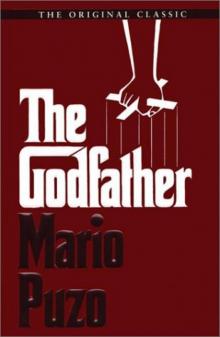 The Godfather
The Godfather The Dark Arena
The Dark Arena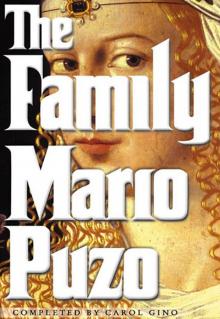 The Family
The Family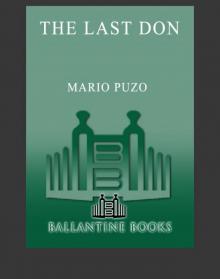 Last Don
Last Don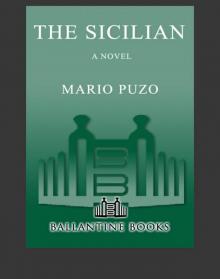 The Sicilian
The Sicilian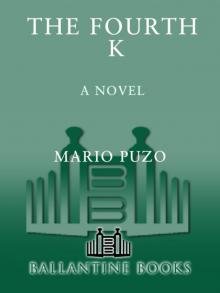 The Fourth K
The Fourth K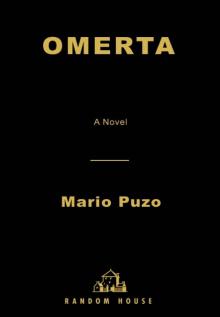 Omerta
Omerta Six Graves to Munich
Six Graves to Munich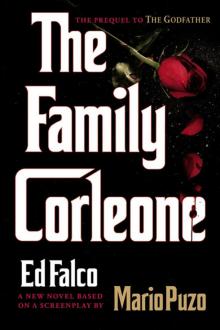 The Family Corleone
The Family Corleone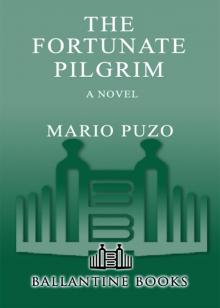 The Fortunate Pilgrim
The Fortunate Pilgrim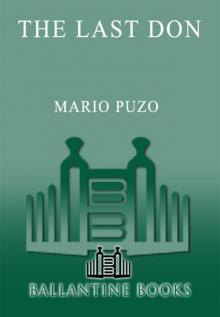 The Last Don
The Last Don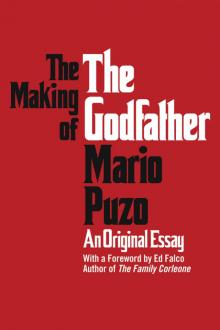 The Making of the Godfather
The Making of the Godfather Fools die
Fools die The Sicilian (v2.0)
The Sicilian (v2.0)